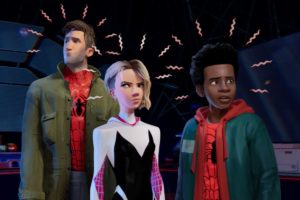Just when you thought the Spiderman franchise might have finally run its course of endless reboots comes SPIDER-MAN: INTO THE SPIDER-VERSE, a film that that reinvigorates both animation and the super-hero origin story. Told in a wry, raucous style, it dares to explore complicated themes of family ties and personal responsibility while slyly poking fun at its own conceit. The writing crackles. The plot surprises, delights, and unexpectedly moves us while gifting us with not one, not two, but several playfully imaginative variations on the Spider-person theme. We also receive confirmation about the integral part that baby powder plays in helping at least one Spidey best the bad guys.
 The latest incarnation of Spider-Man, though he doesn’t know it yet, is Miles Morales (Shameik Moore). He’s soon to be dealing with some of Spider-Man’s greatest villains, but for now he’s coping with a new school, one that caters to his IQ, but one that takes him away from friends at his old neighborhood middle school, and away from his family during the week. It’s put him at odds with his cop father, with the curious name of Jefferson Davis (Brian Tyree Henry), who wants to give his son every advantage while discouraging him from his penchant for artistic expression. That his father also despises the current Spiderman’s vigilante tactics is yet another wedge between father and sone\. Not that the new school doesn’t offer at least one perk in the form of Gwen (Hailee Steinfeld), the cute blonde classmate who laughs at his joke about the relativity of time. He also has his Uncle Aaron (Mahershala Ali), who encourages his love of tagging and shrugs off the disapproval of Milo’s father about his life choices.
The latest incarnation of Spider-Man, though he doesn’t know it yet, is Miles Morales (Shameik Moore). He’s soon to be dealing with some of Spider-Man’s greatest villains, but for now he’s coping with a new school, one that caters to his IQ, but one that takes him away from friends at his old neighborhood middle school, and away from his family during the week. It’s put him at odds with his cop father, with the curious name of Jefferson Davis (Brian Tyree Henry), who wants to give his son every advantage while discouraging him from his penchant for artistic expression. That his father also despises the current Spiderman’s vigilante tactics is yet another wedge between father and sone\. Not that the new school doesn’t offer at least one perk in the form of Gwen (Hailee Steinfeld), the cute blonde classmate who laughs at his joke about the relativity of time. He also has his Uncle Aaron (Mahershala Ali), who encourages his love of tagging and shrugs off the disapproval of Milo’s father about his life choices.
It isn’t long before the fabled radioactive spider makes its appearance, bites Milo, and puts him through  physiological changes that make puberty look like a walk in a flowery meadow by comparison. Because this is a fantasy flick, Milo then meets up with Peter Parker (Chris Pine) in his Spider-Man persona, and is able to get a few words of advice before the unthinkable happens and Parker meets his maker at the hands of Kingpin (Liev Schreiber), a villain who has raised hunched shoulders to new heights. Kingpin is also planning to rupture the time-space continuum for reasons that make the possibility of a black hole opening under Brooklyn a minor consideration. What the semi-mad scientist (Kathryn Hahn) never considered when constructing this device was the possibility of crossovers from other universes, specifically, a slew of Spider-Persons with similar origin stories, but very different lives, from Spider-Ham (John Mulaney), a porcine refugee from a more traditional cartoon dimension; to Peni Parker (Kimiko Glen) an animé Japanese schoolgirl who forms a symbiot with her faithful robot; Spider-Gwen (Steinfeld), a dancer turned crime fighter in hoodie and toe shoes; Spider-Man Noir (Nicolas Cage), and a fedora-ed black-and-white character from 1933 whose trench coat always blows in a breeze, and whose struggles include those of moral ambiguity as well as thugs out to kill him. Of course, the Peter B. Parker (Jake Johnson) from our corner of the multiverse, where packages are not delivered by RedEx, and Comic Con is a treasured cultural expression also appears. This Peter Parker, though, has issues. Lots of issues. And overcoming them, like Milo sorting out his own issues with his father, are as much the fabric of what happens as quips, action, and the bittersweet cameo by Stan Lee.
physiological changes that make puberty look like a walk in a flowery meadow by comparison. Because this is a fantasy flick, Milo then meets up with Peter Parker (Chris Pine) in his Spider-Man persona, and is able to get a few words of advice before the unthinkable happens and Parker meets his maker at the hands of Kingpin (Liev Schreiber), a villain who has raised hunched shoulders to new heights. Kingpin is also planning to rupture the time-space continuum for reasons that make the possibility of a black hole opening under Brooklyn a minor consideration. What the semi-mad scientist (Kathryn Hahn) never considered when constructing this device was the possibility of crossovers from other universes, specifically, a slew of Spider-Persons with similar origin stories, but very different lives, from Spider-Ham (John Mulaney), a porcine refugee from a more traditional cartoon dimension; to Peni Parker (Kimiko Glen) an animé Japanese schoolgirl who forms a symbiot with her faithful robot; Spider-Gwen (Steinfeld), a dancer turned crime fighter in hoodie and toe shoes; Spider-Man Noir (Nicolas Cage), and a fedora-ed black-and-white character from 1933 whose trench coat always blows in a breeze, and whose struggles include those of moral ambiguity as well as thugs out to kill him. Of course, the Peter B. Parker (Jake Johnson) from our corner of the multiverse, where packages are not delivered by RedEx, and Comic Con is a treasured cultural expression also appears. This Peter Parker, though, has issues. Lots of issues. And overcoming them, like Milo sorting out his own issues with his father, are as much the fabric of what happens as quips, action, and the bittersweet cameo by Stan Lee.
Character is key, with even Aunt May (Lily Tomlin) carving out a distinct, irascibley home-spun personality that is more than just offering milk and cookies to the sudden troupe of Spider people. The storytelling makes a conversation between father and son through a closed door as fraught with emotion and suspense as the sequence that finds Parker and Milo swinging through a forest to escape Doc Oc. This is an origin story that is a metaphor for taking the leap of faith away from the safety of the childhood (or in Peter B. Parker’s case, arrested development), and embracing the adventure of adulthood and all its attendant uncertainty.
 The animation that brings it to life is the cinematic equivalent of reading a graphic novel, from reproducing the faint pointillism found in the way dye takes to pulp, to the dialogue boxes, split screens, and the visualization (finally) of the Spidey Sense. Never static, but always keenly aware of its inspiration, it is a synthesis that is never precious, never self-conscious, and always an aesthetic pleasure that builds to the trippy psychedelics of multiverses crashing in on one another. Plus, the best radioactive spider ever. Glowy in all the right places, and simultaneously grotesque and beautiful with its spiky legs and bulbous eyes.
The animation that brings it to life is the cinematic equivalent of reading a graphic novel, from reproducing the faint pointillism found in the way dye takes to pulp, to the dialogue boxes, split screens, and the visualization (finally) of the Spidey Sense. Never static, but always keenly aware of its inspiration, it is a synthesis that is never precious, never self-conscious, and always an aesthetic pleasure that builds to the trippy psychedelics of multiverses crashing in on one another. Plus, the best radioactive spider ever. Glowy in all the right places, and simultaneously grotesque and beautiful with its spiky legs and bulbous eyes.
SPIDER-MAN: INTO THE SPIDER-VERSE will enchant kids and captivate adults. You don’t even have to be a Spider-Man fan to fall under its spell, though you might do just that after seeing this gem. N.B. Stay through the credits, there’s a reward.
Your Thoughts?